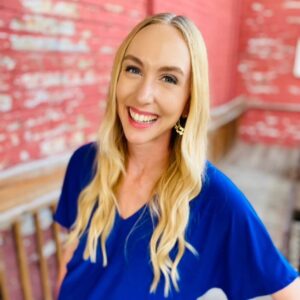When Theodore Miller was preparing to enter college, he had plans to pursue a career in aerospace engineering.
Miller, who is originally from Fishers, Indiana, but frequently moved around the country for his parents’ jobs growing up, describes himself as “an explorer at heart.”
“Exploring and reaching among the stars is something that I had a deep fascination and appreciation for,” he said. “I also always had a strong aptitude for problem solving.”
But one circumstance set him on a different path.
“I come from a fifth-generation deaf family,” he said, speaking through a sign language interpreter in a phone interview with Insurance Journal. “So having access to language is very important to me.”
This means deafness in Miller’s family extends all the way back to his third great-grandparents. Miller, who speaks American Sign Language (ASL), said the colleges he was interested in attending didn’t offer bilingual communication within their aerospace engineering programs.
“I wasn’t really able to access the programs,” he said.
Then, he found Gallaudet University. Based in Washington D.C., Gallaudet is the world’s only university in which all programs and services are specifically designed to accommodate deaf and hard of hearing students using English as well as ASL. Like Miller’s family, it has a unique history of its own.
The university was founded in 1864 by an Act of Congress signed into law by President Abraham Lincoln and began with 12 students. It has grown throughout its more than 150 years to accommodate the more than 1,500 students the school served in 2020, with Miller among its most recent class of graduates.
“I decided to go with Gallaudet University,” he said. “I didn’t actually have a major for two years. I was kind of just feeling it out.”
‘Insurance is Like an Iceberg’
That’s when Miller met James Bruner, the executive director of the Maguire Academy of Risk Management and Insurance (RMI) at Gallaudet.
“Gallaudet, it’s a unique place. It’s a rewarding place. It’s a place where students feel comfortable,” Bruner said. “They have access to sign language in virtually every place on campus.”

Photo source: Gallaudet University website
Although Bruner took on the role of executive director six years ago when Gallaudet’s RMI program launched, his passion for the deaf community began much earlier. While completing his undergraduate degree at Rochester Institute of Technology (RIT) in Rochester, New York, he belonged to RIT’s first class to live in the National Technical Institute of the Deaf dormitory on campus designed to integrate both deaf and hearing students.
“I had never met a deaf person before,” he said. “I didn’t know any sign language, and many people on my floor, including my suite-mate, were deaf.”
He began learning sign language and was fascinated with it, taking classes and serving as a student interpreter. After graduating, he worked as a freelance interpreter in Washington D.C. when he found himself interpreting a meeting at Gallaudet. That opportunity led to a job within the university’s newly formed business risk management department, where he was responsible for analyzing its insurance policies.
After moving on to build a 30-year career in the insurance industry, working with Liberty Mutual Insurance Companies and Arthur J. Gallagher & Co., he ended up retracing his steps back to Gallaudet University – this time to apply for a job as the first executive director of its brand new RMI program.
“I talked to anybody who would listen to me and went to different classes – math classes, IT, psychology, English, you name it. I was there and introduced myself and talked about the program to get it going,” he said. “Eventually one thing led to another, and we became successful. It took a lot of people to make this happen. As they say, ‘It takes a village.'”
Miller was one of them.
“[James] was very excited about this program,” Miller said. “He was like, ‘We just sort of launched this.’ … So I thought, ‘All right, you know, this could be the right thing. Let me give this a shot.'”
Jad Gore, another 2021 graduate of Gallaudet’s RMI program, similarly became interested in insurance unexpectedly. Originally from Massachusetts, he began his college career at RIT studying mechanical engineering and physics.
“I realized that was more of a hobby than a career,” he said. “I traveled the world for four or five months, which really changed my perspective, and decided I wanted to own a business.”
Gore, who is also deaf, landed at Gallaudet University. He too was encouraged to take an insurance class after connecting with Bruner.
“[James] is a teacher, mentor and an advocate of mine,” he said. “He encouraged me to take Introduction to Insurance 101, which was my first course ever relating to insurance.”
Also a newly minted Gallaudet graduate, Nabeela Shollenberger shared a similar story of stumbling upon the RMI program after entering the university with an undecided major.
“I wasn’t sure what I wanted to do,” said Shollenberger, speaking by phone through her sign language interpreter. “[James Bruner] came into our class to present about risk management and insurance, and his presentation impressed me a lot. I didn’t realize that insurance really applies to so many things in the world.”
Philip Adeyeye, a senior at Gallaudet double majoring in accounting and risk management insurance who is also deaf, echoed these thoughts.
“When I learned more about insurance – car accidents, homeowners insurance, disaster relief, severe weather and people being injured – it’s all real life,” he said. “The more I learned, the more interested I became.”
This is exactly what Bruner said he tries to instill in his students.
“Insurance is like an iceberg. We see the little ice on top, but we don’t know what’s underneath, and that’s really what insurance is about when you think about it. It’s a huge industry that most people know very little about,” he said. “Insurance affects every aspect of our lives … Students never dreamed of that until they’ve taken a course in insurance and risk management. Many students will say, ‘Wow, insurance is just amazing. It’s really what holds this whole economy together.'”
Closing Gaps, Opening Doors
The RMI program at Gallaudet is relatively new, launching in 2015 with a donation from Philadelphia Insurance Companies (PHLY) Founder James Maguire.
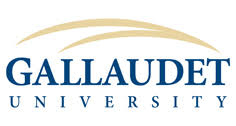
“At Philadelphia Insurance Companies, which was a company I started, we have hired four students from Gallaudet, and all of them are excellent employees,” Maguire said. “My belief when I started this program was that these kids, if they learned the insurance business…they would be able to be as competitive as anybody else in the industry, and it’s turned out to be true. These kids are bright.”
Maguire and his wife Frances live in Chestnut Hill, Pennsylvania, and are founders of the Maguire Foundation, a philanthropic organization that has a focus on providing educational opportunities for youth in addition to its work in arts, humanities and homelessness.
Maguire is not deaf but became passionate about serving the deaf community after volunteering at the Pennsylvania School for the Deaf during his college years. Later, while working at Met Life, he received approval to sell standard insurance to the deaf community, a first in the company’s history.
“[Maguire] put together a life insurance program for deaf people and ended up being one of the top life insurance salesmen for Metropolitan Life Insurance, and the commission that he earned through that is how he started Philadelphia Insurance Companies and Maguire Insurance Agency,” said Sean Sweeney, Maguire’s nephew and a board member at Gallaudet University. “So he always had a soft spot for the deaf community.”
The Maguire Foundation and PHLY began working together in 2015 to start a summer internship for deaf students at PHLY, making it the first insurance company to hire deaf risk management insurance interns from Gallaudet University. PHLY has hired two interns from Gallaudet each summer since then.
“People like me who have been in the business for 40 years will be getting out of the business, and what we want to do is fill those jobs with people that traditionally haven’t had an opportunity to get into industries like insurance, such as minorities and people with disabilities,” Sweeney said. “And we see this as a great way to transform society by giving people that traditionally didn’t get a shot a chance to get into an industry that’s stable, that’s long-term and that provides high paying jobs.” 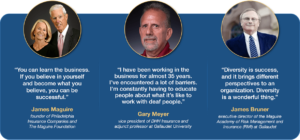
No time seems better than now. Pew Research Center in a recent report found that during the third quarter of 2020, about 28.6 million baby boomers – those born between 1946 and 1964 – reported that they were out of the labor force due to retirement. This is 3.2 million more boomers than the 25.4 million who were retired in the same quarter of 2019, the report stated.
As new generations enter the workforce, expectations for the work environment are changing, Carrier Management previously reported. As a result, insurance companies are facing increased pressure to evaluate their focus on diversity and inclusion to recruit and retain young talent.
According to Pew Research Center, post-millennials—commonly referred to as Generation Z—are on track to be the most diverse generation yet, with nearly half of Gen Z-ers ages six to 21 in 2018 being considered racial or ethnic minorities. That’s compared to 39 percent of millennials ages six to 21 in 2002 being nonwhite, and only 18 percent of early boomers within that age range in 1968 being nonwhite. Bruner said that although things are better today than in the past, the insurance industry needs to continue to develop its efforts toward diversity.
“The insurance industry has a lot of work to do to improve diversity,” he said.
This is why The Maguire Foundation and PHLY are working to raise money for scholarships that serve traditionally disadvantaged minorities as well as the deaf community, Sweeney said. The foundation is aiming to grow its scholarship program through the endowment program at Gallaudet with donations from the insurance industry, organizations and individuals. Beyond financial support, Gallaudet’s RMI program also seeks insurance industry partners to provide internships, mentoring and job placement.
“I told these kids when I talked to them couple of years ago, ‘Believe what you are and become what you believe,'” Maguire said. “I said, ‘You can learn the business. If you believe in yourself and become what you believe, you can be successful.’ … and we’ve had fantastic success. All of the kids that graduate [from Gallaudet’s RMI program] are landing in jobs that are $60,000-$80,000 a year, which is really, really special.”
Gore is among the scholarship recipients, receiving a scholarship from The Maguire Foundation throughout his years at Gallaudet.
“Without [James Maguire’s] contribution, I would never think about having a career in the insurance industry nor even have an opportunity to learn about insurance,” he said.
Sweeney said an advantage of the internship program with PHLY is that students gain real life experience, find the type of jobs that work best for them and learn needed skills to do them well.
“And the insurance industry can see that these employees are exceptionally productive and very enthusiastic,” he said. “A lot of the industry has stood behind us.”
Bruner said Gallaudet’s RMI program, which has 50 students taking classes this year, saw nine students complete internships this summer.
Gore and Shollenberger both completed internships with PHLY, while Miller did an internship with Travelers. The Washington D.C. Department of Insurance, Securities and Banking has also partnered with Gallaudet since 2016, providing internships to its RMI students to learn how insurance regulation plays a role in protecting and educating consumers.
Even one of Gallaudet’s own adjunct professors has been providing internships for its students within his agency. Gary Meyer is the vice president of DHH Insurance in Rochester, New York, and has served as an adjunct professor at Gallaudet for six years.
“Just recently over the summer of 2021, I had hired two interns that are from Gallaudet University,” said Meyer, who is also deaf. “They were working with me for two weeks.”
DHH Insurance works to meet the insurance needs of deaf-owned businesses, interpreters and partnering organizations and has provided insurance programs since 1999 to the deaf and hard of hearing population. It is primarily owned and operated by Meyer, who worked in the insurance industry for 16 years prior to starting his own agency.
“Most of the time, many of the clients that we’re working with have already purchased insurance through other agents, but when I get copies of some of their insurance, I realize that there’s a lot of coverage missing, it’s not the appropriate coverage or the risk assessment isn’t correct,” he said.
Meyer said his goal with the agency is to eliminate communication barriers for deaf business owners so they can better work with interpreters to secure the right insurance coverage.
“A lot of times deaf people aren’t sure if the information that’s been given through the interpreter is the right information,” he said. “I have been working in the business for almost 35 years. I’ve encountered a lot of barriers. I’m constantly having to educate people about what it’s like to work with deaf people.”
Adeyeye, who just completed his internship with The Hartford in July, said dismantling barriers to communication is the most important step.
“Communication is key. Communication is power,” he said. “If you continue to create barriers … it’s tough. It leaves deaf people behind.”
Bruner said he applauds the insurance industry for beginning to break down these barriers and better its diversity efforts.
“We really have created a lot of good support with many insurance companies,” he said. “We’re opening doors for students.”
‘Diversity is Success’
Those open doors are positioning students for success, according to a few of the most recent Gallaudet RMI graduates.
“I was struggling at times and sometimes I doubted myself, you know, and sometimes things were taking longer,” Shollenberger said. “I just definitely have to say a big thank you to the professors [at Gallaudet] for believing in me. Their big goal is to have their students find jobs, and we do become successful.”
Upon graduating, she was hired in a temporary underwriting technical assistance position at Selective Insurance in New Jersey. She was promoted to full-time in August.
“I’m a hard worker, and I believe in doing well at my job,” she said. “My goal is to continue to be a hard worker and learn as much as I can.”
One of Gore’s goals post-graduation was to move to New York City to be closer to his family. With Bruner’s encouragement, Gore passed the New York state broker’s licensing exam and was hired as a client concierge, or producer, at Arthur J. Gallagher & Co. in Manhattan.
“[Bruner] believed that deaf people could work in the insurance industry without any obstacles,” Gore said. “He gave me the courage to take the state of New York broker’s licensing exam, which led me to a job offer.”
Miller also graduated from Gallaudet this year with an RMI degree and is off on his next adventure to Arlington, Virginia, after securing a position as a middle market underwriting technician with The Hanover Insurance Group. The opportunity to provide needed representation and increase diversity within the insurance industry was something that Miller said drew him to this career path.
“[Bruner] believed that Gallaudet’s RMI program would help us deaf and hard of hearing people learn what we needed to learn, learn the new skill sets, so that we could be a part of this industry and fill some of the talent gap,” he said. “And then that would provide more job opportunities for deaf and hard of hearing people in return. That was something that really stood out to me.”
Although he didn’t follow his original plan for a career in aerospace engineering, that doesn’t seem to bother him. Miller – who signed his email with “onwards!” – said that his journey to the insurance industry also fits right in with his passion for exploration.
“Our lives and our paths are always up in the flux and everchanging, so here I am,” he said.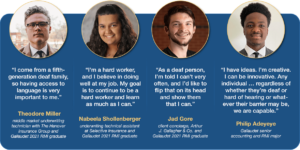
As for Adeyeye, his goal is to work in claims and underwriting once he graduates in the spring of 2022, and there’s something he wants the insurance industry to know.
“As a deaf individual, I can have a business. I can set myself up to succeed. I can develop. I have ideas. I’m creative. I can be innovative,” he said. “Any individual … regardless of whether they’re deaf or hard of hearing or whatever their barrier may be, we are capable.”
Bruner said the success of Gallaudet’s students inevitably brings success to the companies they work with as well.
“Diversity is success, and it brings different perspectives to an organization,” he said. “Diversity is a wonderful thing.”
Learning to Adapt
In fact, inclusivity is inherent within the culture of the insurance industry, according to Randy Jouben, an adjunct professor at Gallaudet and a risk manager for Fairfax County, Virginia.
“Our industry is perfect for this,” he said. “Because of the analytics that are involved, there are opportunities for everyone. If you can’t go out and do a field investigation, there are opportunities behind the desk.”
Bruner agreed, adding that this draws all kinds of people to insurance and is an important part of the industry’s character.
“I always ask people how they got involved in insurance,” Bruner said, “because everyone I’ve met – almost everyone – has a really interesting story to tell.”
Jouben is no exception.
“I actually was originally a commissioned second lieutenant in the U.S. Army,” he said. “I fell and injured my knee, and that kind of ended my military career. So you’ll hear a lot of people say they just fell into the insurance industry. I literally did fall into the insurance industry.”
After he decided to move forward with an insurance career, he started out in claims before switching to the risk management side of the business. He later came across an advertisement for an early founders’ meeting for The Maguire Foundation and asked how he could help with its work to provide scholarships for minority students and those with disabilities. Through that connection, he was asked to teach at Gallaudet.
During his time at the university, Jouben, who is not deaf, said he learned an important lesson about adaptation when he brought his daughter with him to class.
“She went to the cafeteria and a student tapped her on the shoulder to ask her a question, and she didn’t answer. I don’t sign. She doesn’t sign,” he said. “It gave her an immediate recognition that we are the ones who are different now, and we are going to need to adapt to this environment. Adaptation is a two-way street. I need to give my students the ability to communicate with the outside world once they get jobs, but I also need to learn to adapt so I can communicate with them to give them that knowledge.”
He said he believes adaptation is key as the insurance industry welcomes a younger, and more diverse, generation of professionals.
“We need to start being more open-minded as to what people can do, as opposed to just relying on what you think they can’t do,” he said. “If we think outside the box, we can actually overcome and create opportunity.”
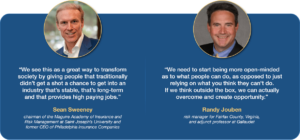
Gore said the more that the insurance industry is exposed to professionals of diverse backgrounds, including deaf professionals, the more likely it will be to hire them. Shollenberger agreed.
“I may be the only deaf person at my company,” she said. “It’s a good thing to teach the people who are in the industry so that they can learn what deaf culture in the workplace looks like.”
Although the insurance industry is largely made up of hearing professionals, Gore said he would love to see more diversity in the future as he pursues his main career goal of owning a business or becoming the vice president of an insurance brokerage.
“Whether it be people of color, people with disabilities or deaf and hard of hearing folks, those I’ve seen so far have really empowered me, and it’s their hard work that gets them there,” he said. “As a deaf person, I’m told I can’t very often, and I’d like to flip that on its head and show them that I can.”
So, what can the insurance industry do to continue working toward more inclusivity?
For Meyer, the answer is simple.
“I always say that it’s okay to hire a deaf person,” he said. “We don’t bite.”
Bruner said the playing field is becoming much more level now than it used to be, and deaf insurance professionals have an opportunity to make a real difference. When it comes to the students he has taught and mentored, he believes they will.
“One day, when I’m totally retired and sitting next to my fireplace, and I get an email from one of my former students telling me that they were just appointed CEO,” he said, “now that would make me smile.”
Was this article valuable?
Here are more articles you may enjoy.


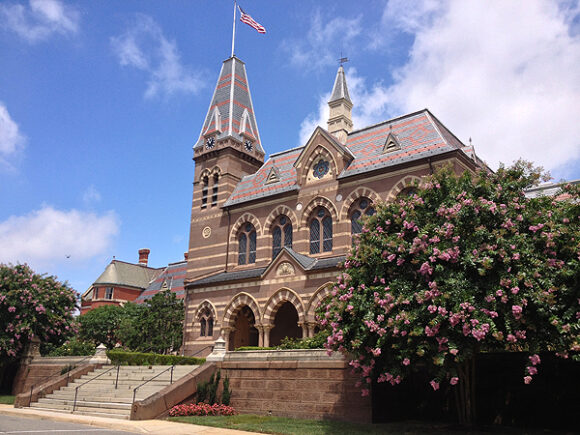
 Married Insurance Brokers Indicted for Allegedly Running $750K Fraud Scheme
Married Insurance Brokers Indicted for Allegedly Running $750K Fraud Scheme  MAPFRE Denied Injunction Against AAA Auto Insurance Sales in Massachusetts
MAPFRE Denied Injunction Against AAA Auto Insurance Sales in Massachusetts  Trapped Tesla Driver’s 911 Call: ‘It’s on Fire. Help Please’
Trapped Tesla Driver’s 911 Call: ‘It’s on Fire. Help Please’  Uber Jury Awards $8.5 Million Damages in Sexual Assault Case
Uber Jury Awards $8.5 Million Damages in Sexual Assault Case 